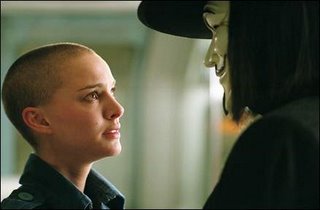 “She Who Must Not Be Named” and I went to see "V for Vendetta" a few days ago and ever since she’s been suggesting that I write down my impressions of it. I’ve held back because, unlike most reviewers, I don’t like being overly negative—but negative is the only appropriate stance toward this misbegotten piece of junk.
“She Who Must Not Be Named” and I went to see "V for Vendetta" a few days ago and ever since she’s been suggesting that I write down my impressions of it. I’ve held back because, unlike most reviewers, I don’t like being overly negative—but negative is the only appropriate stance toward this misbegotten piece of junk.Let’s start with the upside. The direction (by James McTeigue, former assistant director on the Matrix films) is competent, well paced, and informed by a strong visual sense. Some of the acting is superb. Hugo Weaving is quite good as “V”, acting with his body, conveying a reasonable range of emotions from behind an immobile mask. He, however, is unable to overcome the terrible dialogue he has to mouth. Natalie Portman is merely adequate, which is more than I can say for any of her other recent performances. Particularly annoying was her on again/off again British accent. Stephen Rea is wonderful as the dogged detective trying to track down “V.” Tim Piggot-Smith does his standard villain bit, and does so convincingly. Sinead Cusack says more with her lustrous eyes than most do with their voices. And, finally, John Hurt rants effectively in the Big Brother/Hitler role.
The screenplay is by the Wachowski brothers, who did the uneven Matrix trilogy, and acquired cult status in the process. It’s a mess, cobbled together from bits and pieces of much better stories. The starting point is Guy Fawkes’ “Gunpowder Plot” to blow up Parliament in 1605. It soon morphs into a tale of revenge modeled on Dumas’ [pere not fils] “Count of Monte Cristo” [although the reference seems to be more to the 1934 film version starring Robert Donat than to the novel]. A simple tale of revenge and moral awakening is too straightforward for the Wachowski’s though, so they borrow heavily from “Day of the Jackal” which pitted a dogged policeman against a ruthless and brilliant assassin in parallel plots. And then there are the Jack the Ripper, and Phantom of the Opera, and the Orwell references. Well, you get the idea…, it’s a promiscuous mess.
Part of the problem with this film is that it is produced and directed by semi-literate, semi-educated guys who think they are oh so much smarter than their audience. Artistic, filmic, and literary references abound, and they are anything but subtle. A few examples: Portman and Weaving are standing in the foreground discussing the destruction of Parliament and hanging on the wall behind them, framed by their forms is…, Turner’s “Burning of the Houses of Lords and Commons” – get it? If you did you can share with the film makers a small frisson of being one of the smart guys who caught the reference. And such references, most of them filmic, are everywhere. And in case you don’t get it, the characters will occasionally condescend to point them out for you as when Portman blatantly references “Edmond Dantes” the hero of Dumas’ novel [get it?] Some are more obscure, such as the constant playing of Julie London’s “Cry Me A River” [could it have anything to do with her marriage to Jack Webb?] I didn’t get it. I must not be smart enough.
SPOILERS!
And what does all this ostentatious smartness produce? A monster, that’s what! Weaving’s “V” is a monster [and in case you didn’t catch on to that, Portman calls him one], but even worse is the monstrous imagination lying behind the film. The plot and backstory constitute a left-wing wet dream. The
We are meant to sympathize with “V” in his quest for justice and the vehicle for this sentiment is Portman’s “Evey” Early in the film “V” saves her from being raped, using his super-skills to slice and dice her policeman assailants. He then steals her ID card and uses it to carry out an assassination at her workplace, thus implicating her in his schemes and making her a fugitive from justice. She escapes from his underground lair and takes refuge with her kindly boss, a TV personality and [literally] closeted homosexual who is eventually destroyed by the storm troopers. His sin? Owning a copy of the Koran! As she flees the raid Evey is kidnapped again by “V” who tortures and brainwashes her, eventually enlisting her in his plot to blow up the houses of Parliament. “V” then entrusts Evey with the task of carrying out his plot when he is mortally wounded in the process of having Hurt’s dictator killed. Meanwhile, Stephen Rea’s inspector Finch is slowly drawing closer to his quarry and simultaneously uncovering evidence of the government’s past sins. The climax comes when Finch discovers Evey in the act of deciding whether or not to carry out the deceased “V”’s instructions. Will she carry “V”’s plot to completion? Will Rea stop her? C’mon guys, this is a Wachowski movie. Of course Parliament goes up in an impressive pyrotechnic display whereupon the “multitude” of citizens, dressed up in “V” costumes, takes over the government. “V” has died, but he has triumphed by inspiring the masses. He has become legend.
As I said, it’s a mess; poorly conceived, poorly written, adequately acted and directed. Not a big deal. But some geniuses in
I think it was William Goldman who said that the dirty little secret of Hollywood is that "nobody out here knows anything."
Time to rethink this year's marketing campaigns.
Sorry, guys. Better luck next time.
No comments:
Post a Comment